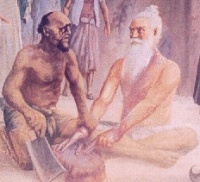Template:AOW278: Difference between revisions
Hari singh (talk | contribs) (Created page with '{{aowh|Bhai Mani Singh Shaheed}} thumb|300px|right|Bhai Mani Singh Shaheed '''Bhai Mani Singh Shaheed''' (martyr) (1670 - 9 July 1737),…') |
Hari singh (talk | contribs) No edit summary |
||
| (4 intermediate revisions by 2 users not shown) | |||
| Line 1: | Line 1: | ||
{{aowh|[[Bhai Mani Singh Shaheed]]}} | {{aowh|[[Bhai Mani Singh Shaheed]]}} | ||
{{p2|File:Bhai Mani Singh M.jpg|[[Bhai Mani Singh Shaheed]]}} | |||
'''Bhai Mani Singh Shaheed''' (martyr) ([[1670]] - [[9 July]] [[1737]]), a great Sikh personality of the eighteenth century | '''[[Bhai Mani Singh Shaheed|Bhai Mani Singh "Shaheed"]]''' ([[martyr]]) ([[1670]] - [[9 July]] [[1737]]), was a great [[Sikh]] personality of the eighteenth century; he occupies a very esteemed position in [[Sikh history]] as he assumed control and steered the course of destiny of the [[Sikh panth]] at a very critical stage. | ||
A great scholar, a devoted Sikh, and a courageous leader, [[Bhai Mani Singh]] willingly laid down his life to uphold the dignity of the [[Sikh faith]] and [[Sikh principles]]. Due to the nature of his [[martyr|martyrdom]], his actions have become a part of the daily [[Sikh Ardas]] (prayer) of the Sikhs. | |||
He is said to have been brought in the early years of his childhood to the presence of [[Guru Tegh Bahadur]] at [[Anandpur]]. He was not the same age as the Guru's own son, [[Gobind Rai]]; however they became close friends. | |||
Bhai Mani Singh remained in his company even after he had ascended the religious seat as [[Guru]] in [[1675]]. Mani Singh accompanied the Guru to the seclusion of [[Paonta sahib]] where [[Guru Gobind Singh]] spent some three years in large part given to literary work.<!-- ------> {{aowf|Bhai Mani Singh Shaheed}} | |||
Latest revision as of 20:19, 16 August 2011
Bhai Mani Singh "Shaheed" (martyr) (1670 - 9 July 1737), was a great Sikh personality of the eighteenth century; he occupies a very esteemed position in Sikh history as he assumed control and steered the course of destiny of the Sikh panth at a very critical stage.
A great scholar, a devoted Sikh, and a courageous leader, Bhai Mani Singh willingly laid down his life to uphold the dignity of the Sikh faith and Sikh principles. Due to the nature of his martyrdom, his actions have become a part of the daily Sikh Ardas (prayer) of the Sikhs.
He is said to have been brought in the early years of his childhood to the presence of Guru Tegh Bahadur at Anandpur. He was not the same age as the Guru's own son, Gobind Rai; however they became close friends.
Bhai Mani Singh remained in his company even after he had ascended the religious seat as Guru in 1675. Mani Singh accompanied the Guru to the seclusion of Paonta sahib where Guru Gobind Singh spent some three years in large part given to literary work. .....More

